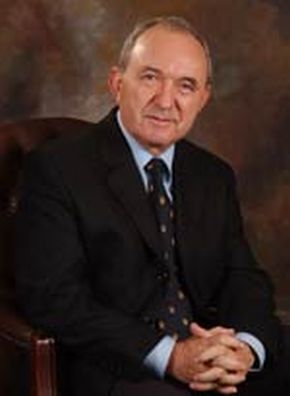
MacArthur will honor Justice Richard J. Goldstone, former Chief Prosecutor of the International Criminal Tribunals for Rwanda and the former Yugoslavia, with the MacArthur Award for International Justice, Foundation President Jonathan Fanton announced today. The Award provides Goldstone with $100,000 for his own work and invites him to suggest an additional $500,000 in support for non-profit organizations working on international justice issues.
As Chief Prosecutor of the Tribunals for Rwanda and the former Yugoslavia, Goldstone helped shepherd these courts, the first of their kind since Nazi war criminals were tried at Nuremberg following World War II. In 1995, Goldstone filed charges of genocide and crimes against humanity against Bosnian Serb leaders Radovan Karadzic and Ratko Mladic for their roles in the “ethnic cleansing” of Bosnian Muslims, among other allegations.
Prior to his appointment as Chief Prosecutor in 1994, Goldstone was chair of the Commission of Inquiry Regarding Public Violence and Intimidation (commonly called “the Goldstone Commission”) in the aftermath of apartheid in his native South Africa. His service on the Commission proved invaluable to the democratic transition in that country, where he also served as an inaugural member of the Constitutional Court.
“Justice Goldstone has played an instrumental role in building the emerging international system of justice,” said Fanton in remarks at a MacArthur-supported conference on international justice at American University. “He gave the tribunals moral authority and legal credibility. It is, in large part, a testament to the quality of his work that the international community accepted the Rome Statute and established the International Criminal Court with confidence. His unquestioned competence and integrity won the faith of the world.”
In selecting Goldstone, the Foundation’s Board of Directors cited his role in the development of the modern era of international justice. As Chief Prosecutor, Goldstone set a high moral and legal standard for tribunals. He insisted on the independence of counsel and judges, transparency in the establishment of facts in each case, due process for the accused, and the importance of first-hand testimony from witnesses and surviving victims. His clarity of vision and meticulous approach to justice brought both a degree of resolution to victims and a new model for the prosecution of crimes against humanity.
“It is an honor to receive the MacArthur Award for International Justice, as the Foundation has been a leader in supporting efforts to advance human rights and international justice” said Justice Goldstone. “Since the early 1990s, we have witnessed the emergence of a system of international justice that is growing stronger with each new case tried in a regional court or UN tribunal and with each investigation opened by the International Criminal Court. It has given me tremendous pride and satisfaction to have played a role in ensuring that the perpetrators of mass atrocities have more reason today than ever to fear being brought to justice.”
The MacArthur Award for International Justice will be conferred upon Goldstone in The Hague on May 25, 2009. Earlier that day, there will be a panel discussion on “The Legacy of the International Criminal Tribunals in National and International Systems.”
Former United Nations Secretary General Kofi Annan was the first recipient of the Award in 2008 in recognition of his contribution to building the International Criminal Court and encouraging the development of the concept of the Responsibility to Protect.
The Award honors individuals and organizations that have –
- Been transformative forces in the fields of human rights and international justice;
- Improved existing – or helped to create new – institutions, norms, and systems of international justice; and
- Demonstrated long-term commitment and made a significant personal contribution to advancing international justice.
MacArthur has long supported efforts to fashion an integrated system of international justice that includes the International Criminal Court, regional human rights courts and commissions, and special tribunals impaneled by the UN. The Award was created to raise awareness of human rights and international justice issues. As part of this effort, the Foundation is supporting a series of regional conferences across the United States, including today’s event at American University. A conference at DePaul University in April examined the International Criminal Court 10 years after the Rome Conference. A conference at Yale University in February will explore how witnesses and victims participate in international courts and tribunals, and a conference at the University of California at Berkeley in the spring will examine how to build the political will necessary to advance the system of international justice.




